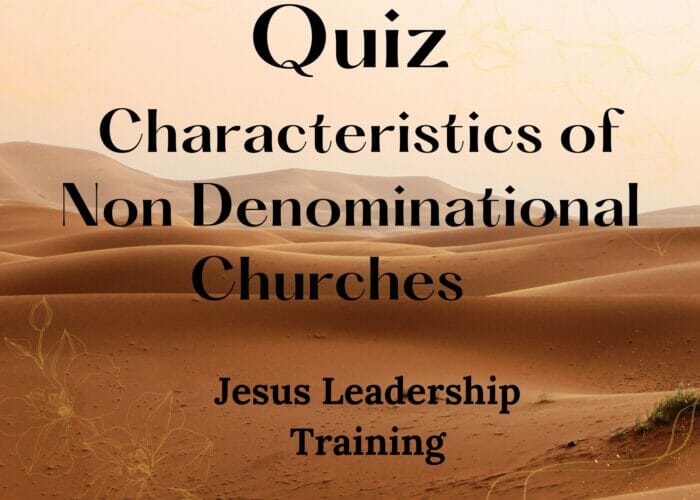15 Multiple choice questions on the topic Characteristics of Non Denominational Churches
- What is the main characteristic of a non-denominational church?
A. Adherence to a set of religious doctrines
B. Membership in a particular denomination
C. Rejection of denominational labels
D. Focus on evangelism
- What is the role of Scripture in a non-denominational church?
A. It is the sole source of doctrine
B. It is the primary source of doctrine
C. It is a secondary source of doctrine
D. It is rarely referred to - How do non-denominational churches view other Christian denominations?
A. They view them as enemies
B. They view them as misguided
C. They view them as equal
D. They view them as superior - What is the primary goal of non-denominational churches?
A. To win converts
B. To promote unity
C. To maintain tradition
D. To spread the gospel - What type of leadership structure is most common in non-denominational churches?
A. Hierarchical
B. Congregational
C. Autocratic
D. Charismatic - What type of worship style is most common in non-denominational churches?
A. Traditional
B. Contemporary
C. Liturgical
D. Eclectic - What type of music is most commonly used in non-denominational churches?
A. Hymns
B. Contemporary Christian
C. Gospel
D. A mix of styles - How are non-denominational church services typically conducted?
A. Formally
B. Informally
C. Strictly
D. Loosely - What type of education is typically offered in non-denominational churches?
A. Bible study
B. Catechism
C. Sunday School
D. None of the above - What type of ministry does a non-denominational church typically offer?
A. Outreach to the community
B. Missionary work
C. Charitable programs
D. All of the above - How do non-denominational churches view baptism?
A. It is required for salvation
B. It is an outward sign of faith
C. It is an unnecessary rite
D. It is a private matter - What type of dress code is typically expected in non-denominational churches?
A. Formal
B. Casual
C. Conservative
D. No particular dress code - How do non-denominational churches view women in leadership positions?
A. They are not accepted
B. They are accepted in some roles
C. They are accepted in all roles
D. They are encouraged to lead - How do non-denominational churches view social issues?
A. They are ignored
B. They are discussed
C. They are debated
D. They are avoided - How do non-denominational churches view other faith traditions?
A. With suspicion
B. With respect
C. With indifference
D. With hostility
Answers with Description
- C. Rejection of denominational labels – Non-denominational churches reject denominational labels and instead focus on being a unified body of believers.
- B. It is the primary source of doctrine – Non-denominational churches rely on Scripture as the primary source of doctrine and teaching.
- C. They view them as equal – Non-denominational churches view other Christian denominations as equal and often seek to build relationships and partnerships with them.
- D. To spread the gospel – Non-denominational churches are focused on spreading the gospel and reaching those who don’t yet know Jesus.
- B. Congregational – Non-denominational churches typically have a congregational leadership structure, with decisions made by the congregation as a whole.
- B. Contemporary – Non-denominational churches typically have a contemporary worship style, with a focus on modern music and technology.
- D. A mix of styles – Non-denominational churches often use a mix of styles, including traditional hymns, contemporary Christian music, and gospel songs.
- B. Informally – Non-denominational church services are typically conducted in an informal manner, with an emphasis on participation and interaction.
- A. Bible study – Non-denominational churches typically offer Bible study classes and other opportunities for spiritual growth and development.
- D. All of the above – Non-denominational churches typically offer a variety of ministries, including outreach to the community, missionary work, and charitable programs.
- B. It is an outward sign of faith – Non-denominational churches view baptism as an outward sign of faith in Jesus Christ, but not as a requirement for salvation.
- B. Casual – Non-denominational churches typically have a casual dress code, with no particular expectation for what people should wear.
- C. They are accepted in all roles – Non-denominational churches typically view women as equal to men in terms of leadership, and accept them in all roles.
- B. They are discussed – Non-denominational churches typically view social issues as important and discuss them from a Biblical perspective.
- B. With respect – Non-denominational churches typically view other faith traditions with respect, recognizing the value and importance of other religions.


